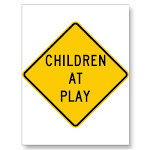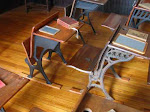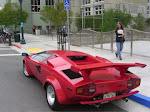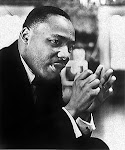We're far from a barrier-free world...a long way from achieving the Dream of which I wrote in my last post. But, thank God for the Americans with Disabilities Act. I cannot imagine navigating through the world with my boy in a pre-ADA world. What in the world did people who use wheelchairs do before sidewalk cut-outs and accessible entrances to businesses, airports, libraries, and museums? I think often of the disabled ADA activists who literally crawled up the U.S. Capitol steps on the run-up to the passage of that great civil rights law to demonstrate why it was so sorely needed.
Thank you, thank you, thank you to you all. Thank you to Republican Dick Thornburg and Democrat Ted Kennedy who were both instrumental in that landmark law.
Accessibility issues never really entered my consciousness until having a
child. And then, it was only to note how great sidewalk cut-outs are when
pushing a stroller. Now, of course, I think about accessibility every single day. Obviously, when I¹m with my boy, I have to search out the elevator at the mall, choose a route to the grocery store with cut-outs, and find a van-accessible parking space. But, it's also with me when I'm without him. I find myself noting whether or not my boy could get into whatever shop or restaurant or office I'm visiting; being really happy when a simple ramp makes a whole establishment accessible (and not just the foyer); and realizing that I'm not going to buy anything at that little boutique after all because my boy couldn't get up the step in front and through the door.
There are two particular components of an accessible world that I rely on and need almost every time I'm out with my boy--a disabled bathroom stall and a van-accessible parking space. Both can generally be found most places ... it's actually really great that nearly every public restroom has one larger stall that can accommodate a wheelchair and that blue curbs and disabled parking spaces are commonplace.
But, just because they're commonplace doesn¹t mean they're available to people who really need them.
Let's talk bathrooms. I've always liked the disabled stalls. Long before kids, long before thinking I'd ever have first-hand experience with disability issues, I took advantage of those large stalls. First, they¹re great when you need to change clothes--like at the airport when you desperately want to get out of the business suit and into jeans for a long flight. Second, they feel a bit more private than the other stalls, which is nice. And third, if you have a young kid with you, it's a lot easier to help her/him when there¹s space to turn around.
I always figured that if the large stall is empty, no harm in going ahead and using it. After all, I'll be done soon enough and the chances of a wheelchair-user needing it at the same time is low. I have learned, though, how wrong-thinking that was. Because so damn many able-bodied people think the same way, the large stall ends up being the first one taken -- the on most often used -- and therefore the one least likely to be free when someone really needs it.
At first, I totally understood that people-by and large-mean no disrespect or thoughtlessness in using the big stall. And I know that's true. But when a 3-year-old needs to pee, he needs to pee. And it is back-breaking, as well as completely lacking in privacy for my boy, to have to transfer him from his powerchair outside a little stall onto the toilet in the little stall.
So, I now have a routine. If we go into a bathroom and the big stall is occupied, I'll look underneath to check for a walker, or crutches, or a wheelchair. When none is there, I'll say something like, "Well, dude, looks like someone is using the only stall that will fit your wheelchair, and all these empty ones out here are too small, so we'll have to wait for him to finish" in a loud (albeit friendly) voice. That usually results in a quick flush and a hurried exit from the able-bodied big-stall-occupier.
I also tell this tale to everyone I know so they will remeber to use the little stalls and keep the big one open for those who need it.
Parking is another issue. Unlike stall-users who, I think, just don't think about whether someone might need the space, I consider disabled-parking abusers by and large selfish, callous, and rude. Well, I guess there are different types.
First type: the "I'm just waiting for my friend and will pull out of it anytime someone needs it." Okay, I know that may not seem completely unreasonable and you don't mean to be rude, but if you think for a second, you'll realize that: (1) if it appears that all the spots are taken, someone who really needs one likely will just keep driving around looking in vain for a spot; (2) people with physical disabilities aren't really able to stop, get out of their car and ask you to please move; and (3) disabled only means disabled only, damnit!
Second type: the "I have a disabled placard even though I don't really need it." Okay, maybe you can't really tell from seeing someone spring from their car and run into Macy's whether maybe they really have some hidden disability (such as a legitimate medical issue like pulmonary disease, etc.) and do need that spot. But, come on! I can't count high enough to keep track of all the perfectly-able-bodied-appearing people who have taken spots I need to unload my son from the van. I know, I just know in my heart that a huge number of people with disabled placards don't really need them and are just abusing the system. And, I'm sorry, but elderly does not necessarily equal disabled. My parents are pushing 80 and they park in steerage just like everyone else because they can actually walk through a parking lot and don't need space to unload equipment. Able-bodied people of any age need to leave the spots for those who really need them.
Third type: the "sack of ----." This is rare, but happens. People with no disability and no placard take up a disabled parking space because they are too lazy or too selfish or whatever to deal with parking like everyone else. They need to have their cars towed and sold at auction to fund disabled services for the city. Once, we even had a car park in the cross-hatch of a disabled spot--making it impossible to open the side door of our van and deploy the ramp. I've never wanted to slash a set of tires more in my life (of course, I didn't). But such selfishness really is enraging.
Also in this category are people who fraudulently get a disabled placard. See this enraging recent San Francisco Chronicle story about abuse of disabled placards: http://www.sfgate.com/cgi-bin/article.cgi?f=/c/a/2007/03/26/MNGOLORI7C1.DTL&hw=placards&sn=001&sc=1000. It focuses on the loss to the city of parking fees. I think I remember a Dateline piece some time back where they approached people who had placards, but looked very suspiciously able-bodied.
Speaking of cross-hatches -- people put all kinds of stuff in them. Shopping carts are the most common thing, but also stores leave empty pallettes, and once a moped parked in one next to my van...again making entry and exit impossible for my boy.
Okay, what's the point of this rant? I don't know, but it feels good to rant sometimes. Seriously, I am convinced that most of these offenses are simply out of ignorance and that we need a public education campaign letting people know that those stalls, those spots, those sidewalk cut-outs that people stand in all the time, exist for a very specific reason and that the able-bodied need to just keep them open. Even if it seems silly, even if it seems unlikely that anyone within miles actually needs it, just leave it free and clear because when someone does need a van-accessible space, or a large bathroom stall, or a sidewalk cut-out, they really really need it.
Oh, a ticket for illegally parking in a disabled spot should cost at least $1,000 for the first offense, $5,000 for the second, and on the third you should have your license suspended for at least one year.
Unless it's a Lamborshini Countach like the one in the picture above (found on the blog http://infospigot.typepad.com/infospigot_the_chronicles/2007/03/powerful_sports.html). This car parked outside a library in Berkeley, California actually had a placard hanging on the rear-view mirror, but boy one wonders. It's hard enough to climb into a sports car as an able-bodied twenty year old, so it's hard to imagine someone with a true physical disability would drive such a beast. If the placard for this "supercar" was not legitimate, I'd want the car seized and auctioned off and all money given to disability rights groups or other non-profits that serve people with disabilities.
CONVERSATIONS ABOUT INTER-ABLED ROMANCE, part 5
9 years ago







